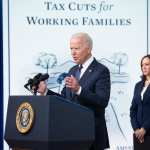Ahead of President Joe Biden’s expected rollout on Wednesday of a wide-ranging infrastructure plan, a coalition of advocacy groups focused on caregiving announced a $20 million campaign aimed at shoring up support for their priorities.
The #CareCantWait coalition is calling on the administration and Congress to include measures in the next major piece of recovery-related legislation that would invest $450 billion in Medicaid home and community-based services; cap child care at 7 percent of family income; and guarantee at least 12 weeks of paid leave for new parents or to deal with a personal or family illness.
According to details of the campaign — first shared with The 19th on Tuesday — groups including the National Domestic Workers Alliance, TIME’S UP, the National Women’s Law Center, MomsRising and the Service Employees International Union will mobilize their millions of members and volunteers to pressure Congress to pass the Biden plan with provisions that could directly impact their constituencies. The campaign includes paid television, radio and digital ads, as well as grassroots efforts like on-the-ground actions in Washington, D.C., and states including North Carolina, Wisconsin, Pennsylvania, Michigan, Arizona, West Virginia and Georgia.
Fatima Goss Graves, president of the National Women’s Law Center, said the campaign builds on the work of several of the same women leaders who advocated for racial and gender equity in the pandemic relief package signed into law this month.
“As we begin to chart a course forward around long-term recovery from the economic recession and long-term job growth, we have to center the issues of care and the drivers of this economic recession that we’re actually in,” said Graves. “As we look forward, we can’t put care to the side. We have to approach it with urgency.”
Coalition leaders say they have been in frequent contact with the administration as the legislation was crafted, meeting with different White House officials and people on Vice President Kamala Harris’s team weekly. They said they are encouraged by the conversations across agencies focused on their issues.
They say their proposals align with much of Biden’s own campaign platform around caregiving and are key to an economic recovery that must factor in women and people of color — many of whom work in such roles.
The infrastructure bill to be laid out by Biden in Pittsburgh on Wednesday is expected to include measures on the country’s physical infrastructure, like roads and bridges, as well as on caregiving. Unlike the relief bill that already passed, this proposed legislation will also include tax increases. Funding physical infrastructure is more likely to have bipartisan support, though Republicans are almost certain to oppose tax increases.
“We really have to invest in the future, and that means permanent solutions to some of these problems that have existed for years and turned this from a problem to a crisis,” said Latifa Lyles, vice president of policy at TIME’S UP, a member of the coalition that works to combat gender-based workplace discrimination.
“This would create millions of new jobs for the women hit hardest by this crisis, generate hundreds of billions in economic activity and allow folks who have been pushed out to return. We are at a turning point. This is not just an opportunity for us to catch up.”
The pandemic and related economic downturn have hit women and people of color the hardest. Many of the 2.5 million women who have dropped out of the workforce since the start of the pandemic were forced out due to caregiving needs, and many who have kept working are juggling the burden of caring for children or older relatives.
Half of the 400,000 jobs lost in the child care sector at the start of the pandemic have yet to return. And low-wage service workers have been among those most severely impacted by layoffs.
Many of the leaders of this new coalition met with Harris in February to discuss the impact of the American Rescue Plan on women and to push for proposals including aid for child care, food and housing assistance, and unemployment insurance.
“I really do feel like the care element of what people are struggling with right now was really clear in what they were trying to address in the rescue plan and that makes me very hopeful that they have their eye on this, too,” said Ai-jen Poo, executive director of the National Domestic Workers Alliance, one of the coalition members.
“This isn’t a special interest thing or a side issue or a ‘nice to have,’” she continued. “I’m very hopeful that the jobs and recovery plan reflects that. Regardless, we’re going to keep pushing.”
Coalition leaders say a growing and returning list of Democratic lawmakers are expected to make the case in Congress, including Reps. Pramila Jayapal of Washington, Debbie Dingell of Michigan and Rosa DeLauro of Connecticut and Sens. Patty Murray of Washington, Kirsten Gillibrand of New York, Elizabeth Warren of Massachusetts and Maggie Hassan of New Hampshire.
But the groups say their campaign will also be focused on building bipartisan support around caregiving issues in the proposed bill. The pandemic relief package passed with no Republican votes, despite efforts from the Biden-Harris administration to reach out to GOP lawmakers.
“One can only hope that Repbulican lawmakers will be responsive to Republican voters,” said Poo. “We’re going to leave no member of Congress untouched by this agenda and we have lots of Republican caregivers who will be talking about how urgent and important this is.”






